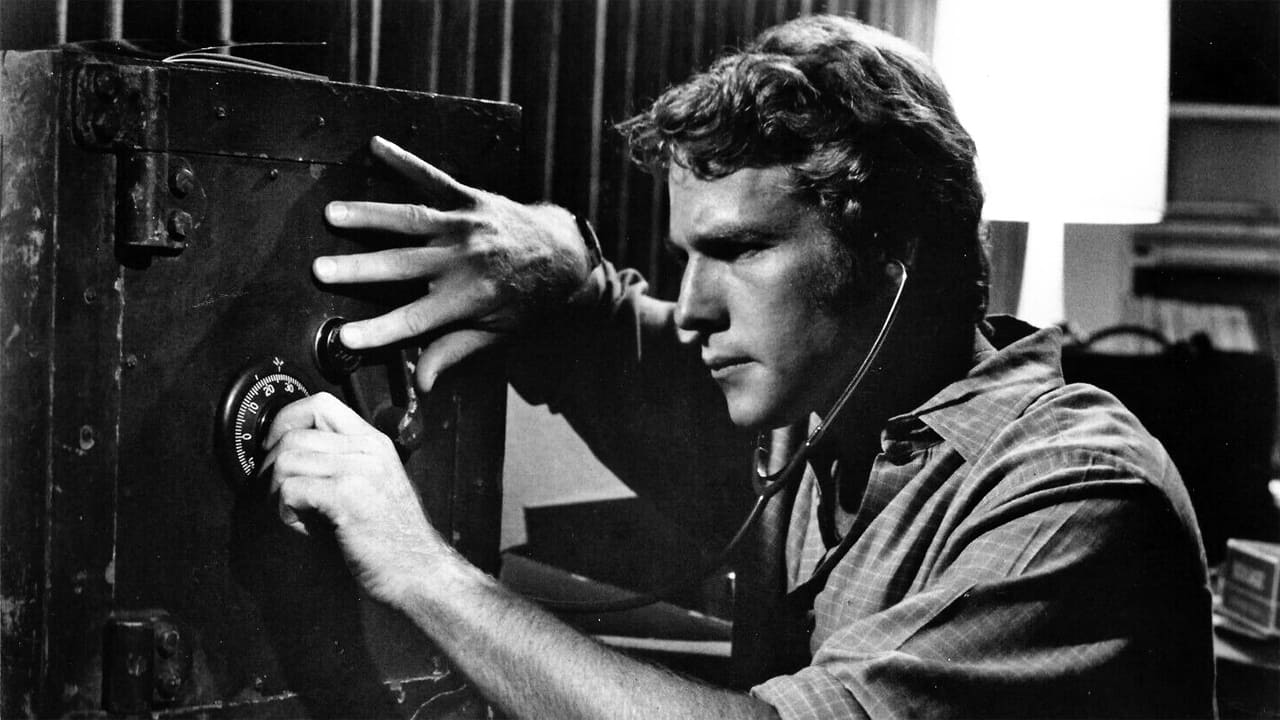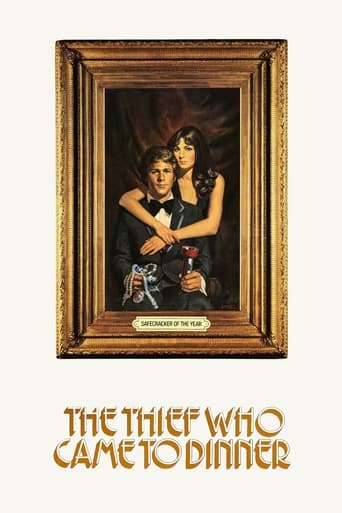

I have pleasant memories of watching this TV-ish little crime drama way back when. Other than a word or two, maybe a drop of blood or flash of bed, The Thief Who Came to Dinner came to the small screen and snuggled right in. I've seen the movie twice, once on broadcast TV and one more time as a rental, back when most people had to rent the VCR along with the movies. What stands out is my memory of the late, great Warren Oates as an insurance investigator tracking Ryan O'Neal, an urbane computer programmer who goes rogue, burgling some sort of sparkly valuables. Jacqueline Bisset is on hand to walk around in nice outfits and be teddibly urbane herself.But, on a whole, with the harried Oates getting closer and closer to nabbing O'Neal, it's a pleasant flick. I think I liked the type of stay-at-home-and-watch-a-fun-movie movie that TTWCTD is. Kind of like The Hot Rock, a contemporary of the time. One more thing about Bisset. I recently stated that she would have to be really off her game to not screw up a movie. Roger Ebert said that, in Bullitt, whenever she appeared it took five minutes for the movie to recover. I'm wondering if there was a direct correlation between her being anything like naked in a movie and her being just awful. In Bullitt, she has sex with Steve McQueen (bare shoulders and asleep) and she sucks. In The Sweet Ride, her breasts are on display (but about a thousand yards out), and she sucketh verily. The Deep? No acting talent visible, but through that wet tee, yikes!You get my point. The boobs come anywhere near the surface and the deleterious effects on the movie are in full view. I'm tempted to lop out the last couple of paragraphs because it just feels like a cheap shot against what could possibly be a very nice person in real life. Naw. I tried nice. I didn't like it.Besides, there have got to be some more movies with her that her chest is on display. Did she suck pond water in those, too? Wouldn't that be an interesting research paper for a film class?
... View MoreRyan O'Neil is one of those actors who, given the right part, can hit it out of the ballpark. Like his con artist character in "Paper Moon", the thief is outwardly a comely young man, a charmer, even a gentleman. That's what thieves are supposed to be. They don't kill people, or use violence (at least these types of thieves never do in the movies!). They have wit, humor, and even a little humility, which is what makes their underlying darker side so much more terrifying, enigmatic, and also intriguing. These thieves don't hold up the corner liquor shops in the seedy side of Brooklyn or ransack cheap apartments in New Jersey. They procure their desired objects from jewelry shops in the upper-crust of downtown Manhattan or the large brick houses of the Brookline area of Boston. This is the only kind of thief O'Neal could swing at with a chance of hitting a homer, and he does.Webster (O'Neal) is nicknamed "the Chess Burglar" as he begins playing a hypothetical chess game with the police, leaving a chess piece and a move with every robbery. He mainly heists jewels from people who don't really need them, like a modern-day Robin Hood. He does his game, both the robbing and the chess, with deft finesse and surgical precision. The police, unable to figure out who their thief really is, at one point hire a professional chess master to oppose the nameless thief-artist to try and create a profile of him based on his moves. At one point, even the chess master comes to his wits end trying to deal with the chess burglar. You may find that a chess master and cunning thief have more in common than you might have expected...This is a thoroughly enjoyable movie and certainly one of O'Neal's best performances. (I always thought O'Neal would have been perfect as "The Great Gatsby".) This movie deserves DVD treatment, considering many god-awful Hollywood offerings have been released from this era. (I mean, are there people who would actually buy a copy of Airport 1975 or "The Towering Inferno"?) This is a highly intelligent and yet simultaneously quite entertaining film that does exactly what it wants to do, with enough twists and turns that do not foreshadow a very interesting and unexpected ending. And the script was by Walter Hill who made a career of raising lowlifes to the big screen. Please vote for this movie for DVD release.
... View MoreFor some reason, I very much love "heist" movies, perhaps because I would never steal anything in my life and I guess opposites attract. While I don't quite like this one as well as I love the Steve McQueen, Faye Dunaway "Thomas Crown Affair," another heist movie with great style from the 70s, the marvelous Henry Mancini soundtrack and the involvement of Ryan O'Neil, Jacqueline Bisset, and Warren Oates make this one a winner in my view. All those reviewers who declared the movie "dated" or "slow" are revealing their MTV-generation mind-rot, where if each frame doesn't flicker by in a quarter second or if the film isn't loaded with computer graphics or special effects, they get bored, because I really don't know what they are talking about--the movie moves along just fine for an adult. It seems that most of the action in the movie, and particularly each robbery, is practically a dance which is fluidly paired with the Mancini music. This is set up almost at the very beginning when the thief is perfecting his lock-picking, safe-cracking, and breaking-and-entering techniques, and it never lets up from there. I suppose, though, that if you don't like Henry Mancini, this movie is not for you.O'Neal demonstrates here his skills for comedy that he had put to even better use in the absolutely hilarious "What's Up Doc" with Barbra Streisand and Madeline Kahn (possibly the funniest movie ever made), also sharing with this movie cast members Austin Pendleton and Michael Murphy. Whereas O'Neal succeeds here with his charm and definite good looks, and he is clearly a good match for the beautiful, somewhat rebellious and "alternative" Jaqueline Bisset, the best pairing is probably the "cat and mouse" interaction with insurance investigator Warren Oates. This, too, is psychologically another example of "opposites attract," as despite being on nearly opposite poles, the two form a kind of mutual bond. Like prison guard and prisoner, they exist in the same realm of life, I guess.I also enjoyed O'Neal's two partners in crime, the nervous-but-excited fence played by Ned Beatty and his humorous boxer sidekick, played by Gregory Sierra.It was fun to see the early mainframe computer technology shown in the film (current at the time the film was made), which is what computers WERE when I started my adult working life (and which it seems they are going back to with all the servers and workstations, now). And I appreciated seeing the Houston setting, not often shown in films. As America's oil capital, Houston's prosperity rises and falls with the energy cycles and probably at the time the film was made, Houston was at one of its prosperity peaks. The beautiful mansions of the Texan oil rich (who aren't at all shy about spending their wealth on jewelry, art, and other luxury goods) quite reasonably make an attractive target for a thief.Thanks to video, I've been able to watch this movie many, many times, much in the same way that I might watch a music video--for the interaction of music and action, although in a more languid and less frenetic way. Not slow, not dated, but very much fun and quite beautiful and enjoyable.
... View MoreIn 1973, the best chess programs running on the fastest supercomputers could barely play a passable game of chess, much less challenge a master level player such as the Austin Pendleton character would be (newspaper chess columnist for the Houston Chronicle).
... View More